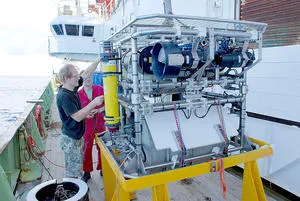
UK and Brazilian scientists will be working together to study the formation of critical ocean minerals essential for new technology – particularly environmental technology such as photovoltaic cells.
MarineE-tech, a £4.2-million research programme funded by NERC (UK) and FAPESP (Brazil), will assess deep ocean ferromanganese deposits – a major resource of elements that include cobalt, tellurium and the rare earths used in E-technologies
The National Oceanography Centre’s Dr Bramley Murton will lead the programme. He said, “There is a high demand for E-tech elements but their supply is scarce. They are particularly important in the development of new eco-environment technologies. Our MarinE-tech programme will study how ferromanganese deposits are formed in the deep ocean and what controls their composition.
“A research expedition is planned for next year to the northeast Atlantic to discover what controls the richness of these deep-sea deposits.”
In addition to the research, the team will be looking at novel exploration methods and assessing any potential disturbance of sensitive marine environments. This will help to establish a best practice and regulatory framework.
MarinE-tech is a collaboration between the UK’s National Oceanography Centre and the Instituto Oceanográfico da Universidade de São Paulo (IO-USP). Dr Frederico Brandini is the director of IO-USP and a principal research scientist.
Dr Murton continued “The study will also explore sustainability issues, especially those deposits in the territories of small nation states with developing economies. We also intend to assist with developing scientific capability in the South Pacific Islands.”
The partnership spans industry, academia and policy makers and includes the University of San Paulo (Brazil), the University of Bath, the British Geological Survey, SOPAC and the South Pacific Island Communities, the United Nations’ International Seabed Authority, HR Wallingford, Gardline Ltd, and Soil Machines Division Ltd, Gateshead.
There will also be opportunities for students from NOC and IO-USP to participate in an exchange programme.